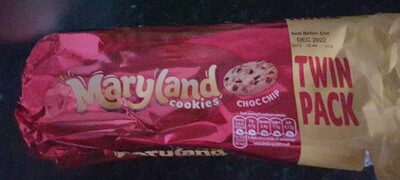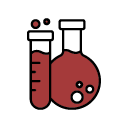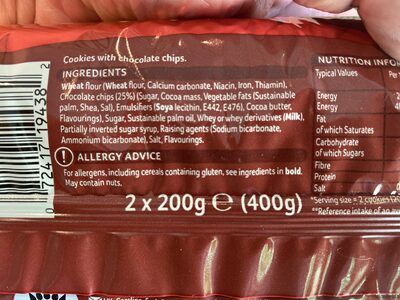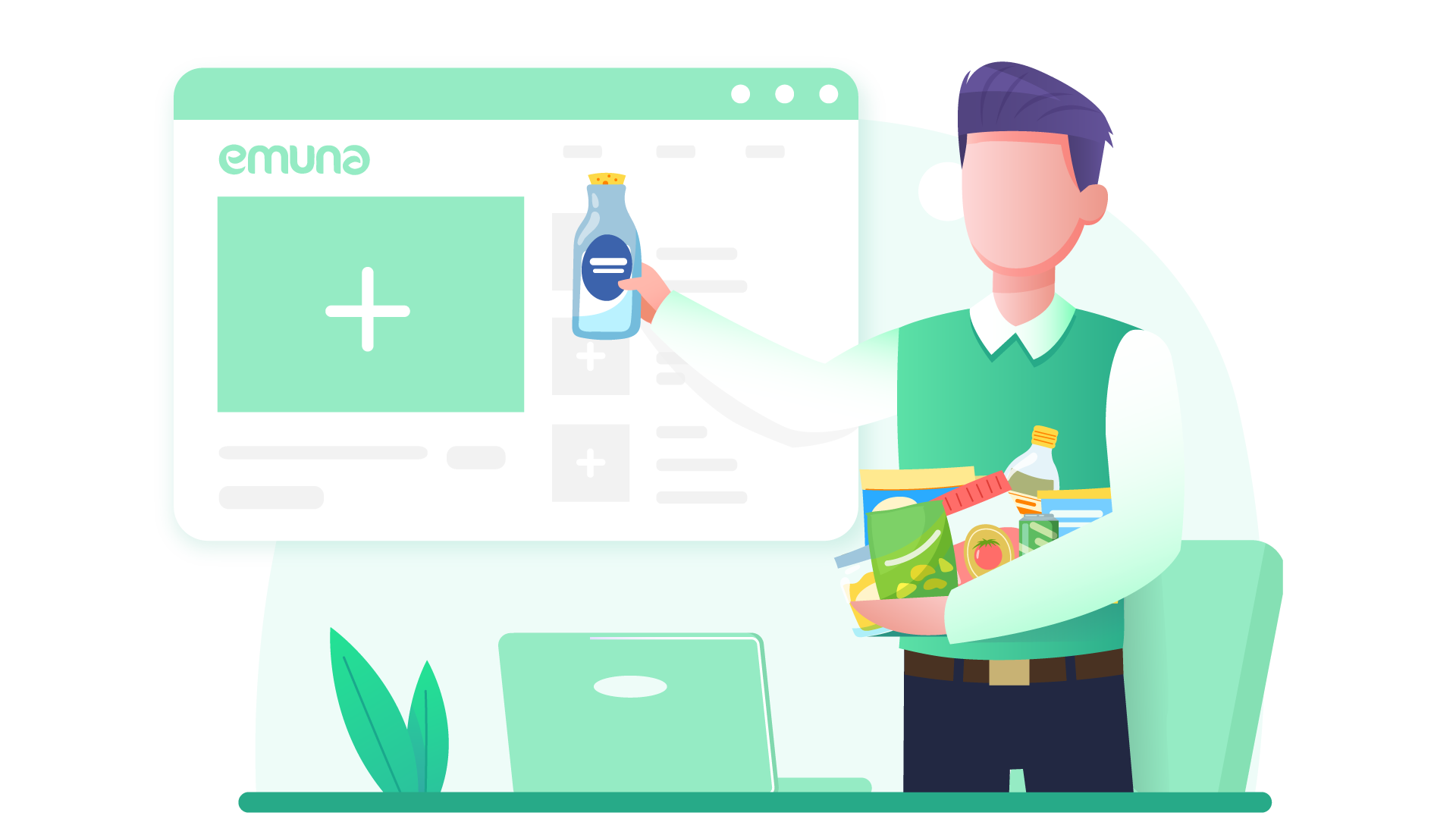
Maryland cookies
Ingredients
Wheat flour, Calcium carbonate, Niacin, Iron, Thiamin, Chocolate chips (25%) (Sugar, Cocoa mass, Vegetable fats (Sustainable palm oil, Shea fat), Emulsifiers (Soya lecithin, E442, E476), Cocoa butter, Flavourings), Sugar, Sustainable palm oil, Whey or whey derivatives (Milk), Partially inverted sugar syrup, Raising agents (Sodium bicarbonate, Ammonium bicarbonate), Salt, Flavourings. ALLERGY ADVICE: For allergens, including cereals containing gluten, see ingredients in bold. May contain nuts. 2x 200g e (400g) Typical Values NUTRITION INFO per 24 48 Energy Fat.Category
en:chocolate-chip-cookies
Brand
Maryland
Sold in

Barcode
072417194382
Processing
Additives
-
Ammonium bicarbonate, also known as ammonium hydrogen carbonate (NH₄HCO₃), is a chemical compound that acts as a leavening agent in baking, particularly for flat, crisp baked goods like crackers and cookies. It releases ammonia and carbon dioxide gases when heated, causing the dough to rise. Besides baking, it's used in fire-extinguishing compounds, pharmaceuticals, and fertilizers.
-
Separating agent, anti-caking agent; synthetically produced; used in table salt and spice mixes. Generally safe in normal use but can produce harmful compounds when heated.
Not Restricted
-
Acid regulator, stabilizer, emulsifier; synthetically produced; used in baked goods, cheese, and dairy products. Side effects are rare but may cause digestive issues if consumed in excess.
Not Restricted
-
Ein weißes Pigment, das als Farbstoff, Opazifikator und UV-Filter in Lebensmitteln, Kosmetika und anderen Produkten verwendet wird. Mögliche Risiken: Es gibt Bedenken hinsichtlich der Sicherheit bei der Aufnahme von Titandioxid-Nanopartikeln. Einige Studien haben gezeigt, dass sie Entzündungen und Zellschäden im Körper verursachen können.
Restricted
-
Acid regulator, leavening agent, stabilizer; derived from natural minerals or synthetically produced; used in baked goods, beverages, and canned foods. Side effects are rare but may cause digestive issues if consumed excessively.
Not Restricted
-
Anti-caking agent, separating agent; obtained from natural minerals or synthetically produced; used in table salt, spice mixes, and dietary supplements. Generally safe with normal use.
Not Restricted
-
No description
Questionable Ingredients
-
Refined white sugar is associated with health risks such as weight gain, type 2 diabetes, heart disease, and tooth decay. The World Health Organization (WHO) recommends limiting daily sugar intake to less than 10% of total daily calorie intake, which corresponds to about 25 grams of sugar (6 teaspoons) for a physically active adult. A further reduction to 5% (3 teaspoons or 15 grams) may offer additional health benefits. High sugar consumption can lead to overweight, type 2 diabetes, heart disease, and tooth decay. It is advisable to reduce the consumption of added sugars and focus on a balanced diet with natural, unprocessed foods.
-
Palm oil is concerning due to its high content of saturated fats and its association with health risks like cardiovascular disease and weight gain. There may also be a link to cancer, although study results are mixed. The WHO recommends limiting daily saturated fat intake, including those in palm oil, to less than 10% of total calorie intake. To minimize health risks, it is advisable to replace palm oil with healthier vegetable oils rich in unsaturated fats.
-
Mixture of glucose and fructose; high sweetness.
-
Generic flavor declaration without specification.
Additives
-
Ammonium bicarbonate, also known as ammonium hydrogen carbonate (NH₄HCO₃), is a chemical compound that acts as a leavening agent in baking, particularly for flat, crisp baked goods like crackers and cookies. It releases ammonia and carbon dioxide gases when heated, causing the dough to rise. Besides baking, it's used in fire-extinguishing compounds, pharmaceuticals, and fertilizers.
-
Separating agent, anti-caking agent; synthetically produced; used in table salt and spice mixes. Generally safe in normal use but can produce harmful compounds when heated.
Not Restricted
-
Acid regulator, stabilizer, emulsifier; synthetically produced; used in baked goods, cheese, and dairy products. Side effects are rare but may cause digestive issues if consumed in excess.
Not Restricted
-
Ein weißes Pigment, das als Farbstoff, Opazifikator und UV-Filter in Lebensmitteln, Kosmetika und anderen Produkten verwendet wird. Mögliche Risiken: Es gibt Bedenken hinsichtlich der Sicherheit bei der Aufnahme von Titandioxid-Nanopartikeln. Einige Studien haben gezeigt, dass sie Entzündungen und Zellschäden im Körper verursachen können.
-
Acid regulator, leavening agent, stabilizer; derived from natural minerals or synthetically produced; used in baked goods, beverages, and canned foods. Side effects are rare but may cause digestive issues if consumed excessively.
Not Restricted
-
Anti-caking agent, separating agent; obtained from natural minerals or synthetically produced; used in table salt, spice mixes, and dietary supplements. Generally safe with normal use.
Not Restricted
-
No description
Questionable Ingredients
-
Sugar
Refined white sugar is associated with health risks such as weight gain, type 2 diabetes, heart disease, and tooth decay. The World Health Organization (WHO) recommends limiting daily sugar intake to less than 10% of total daily calorie intake, which corresponds to about 25 grams of sugar (6 teaspoons) for a physically active adult. A further reduction to 5% (3 teaspoons or 15 grams) may offer additional health benefits. High sugar consumption can lead to overweight, type 2 diabetes, heart disease, and tooth decay. It is advisable to reduce the consumption of added sugars and focus on a balanced diet with natural, unprocessed foods.
-
Palm Oil
Palm oil is concerning due to its high content of saturated fats and its association with health risks like cardiovascular disease and weight gain. There may also be a link to cancer, although study results are mixed. The WHO recommends limiting daily saturated fat intake, including those in palm oil, to less than 10% of total calorie intake. To minimize health risks, it is advisable to replace palm oil with healthier vegetable oils rich in unsaturated fats.
-
Invert sugar
Mixture of glucose and fructose; high sweetness.
-
Flavoring (unspecified)
Generic flavor declaration without specification.







